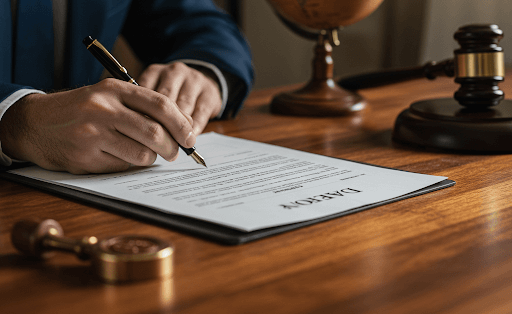Understanding Power of Attorney in Bangladesh: A Guide for Domestic and Foreign Issuances

A Power of Attorney (POA) is a legal document that grants one individual the authority to act on behalf of another, as per Section 2(1) of the Power of Attorney Act, 2012. Similarly, a Foreign Power of Attorney in Bangladesh is a legal document that allows a person, referred to as the Principal, who resides outside Bangladesh, to authorize another individual or organization, known as the Agent, to act on their behalf in managing assets or handling matters within Bangladesh.
It is important to note that according to the Contract law, the Attorney must be an adult, of sound mind, and be qualified to execute a contract. The Power of Attorney Act 2012 and the Power of Attorney Rules 2015 are the laws related to Power of Attorney.
For those residing abroad, issuing a Power of Attorney for use in Bangladesh requires additional steps, including notarization and consular authentication, to ensure the document’s validity.
This guide will walk you through the process of issuing a Power of Attorney in Bangladesh, including what’s needed for individuals or companies located abroad.
Types of Power of Attorney in Bangladesh
1. General Power of Attorney (GPA) in Bangladesh
General PoA provides right to the agent/attorney to carry out all legal acts on behalf of the principal. They provide broad authorizations, have extensive decision-making powers and also encompasses various actions, including financial, legal, and property-related decisions.
Key features:
- Broad Authority: The general power of attorney has comprehensive powers to manage the principal’s affairs, from financial matters to entering contracts, and managing operations.
- Execution Requirements: The document must be signed by the principal, attested by witnesses and notarized.
- Registration: Registration is required for property transactions at the Sub-Registrar’s office where the property is located.
- Duration: It is valid for a specified period or until a specific event occurs. It is temporary, as it can be revoked either when the principal becomes incapacitated or dies.
- Revocable: The principal can revoke at any time.
- Foreign Execution: If executed outside Bangladesh, it must be properly notarized and sometimes authenticated by the Bangladesh Embassy/High Commission in that country.
- Termination: It terminates upon the principal’s death, insanity, or bankruptcy unless otherwise specified.
- Flexibility: It can be used for both business and personal matters.
2. Special Power of Attorney (SPA) in Bangladesh
A Special Power of Attorney grants limited authority for specific tasks. For example, it may be used to authorize someone to sell a piece of property, manage business operations, or handle a legal case, etc.
Key features:
- Limited Scope: A special Power of Attorney grants authority only for specific matters explicitly mentioned in the document by defining the exact scope and limitations of the powers being granted.
- Execution Requirements: The document must be signed by the principal, attested by witnesses and notarized.
- Duration: The time can be limited for a specific period or until the completion of the specified task.
- Automatic Termination: It terminates automatically once the specified task is completed.
- Revocability: Can be revoked by the principal at any time even before completion of the specific task.
- Judicial Interpretation: Courts in Bangladesh strictly interpret SPAs according to their specific wording, without extending powers beyond what is explicitly stated.
- Uses: Common uses include selling/purchasing specific property, representing in particular court cases, or completing specific business transactions.
- Foreign Execution: If it is executed outside Bangladesh, it must be properly notarized and authenticated by the Bangladesh Embassy/High Commission in that country.
3. Irrevocable Power of Attorney [IGPA] in Bangladesh
An Irrevocable Power of Attorney and/or Irrevocable General Power of Attorney [IGPA] is a legal instrument that grants an agent/attorney the authority to act on behalf of the principal, with the distinctive feature that the principal cannot revoke this authority unilaterally. This irrevocability is typically upheld when the POA is coupled with an interest, meaning the agent/attorney has a vested interest in the subject matter of the power.
In Bangladesh, as defined under Section 2(4) of the Powers-of-Attorney Act, 2012, an irrevocable power of attorney is utilized for specific purposes, including:
- Executing agreements for the sale of immovable property.
- Mortgaging immovable property against loans.
- Developing or transferring land.
Once such a POA is executed, it remains in effect for the specified term and cannot be revoked by the principal unless otherwise stipulated within the document.
Key features of Power of Attorney:
- Irrevocability: Once executed, the principal cannot revoke unless otherwise specified. The only exceptions to this are if the POA document specifically allows for revocation or if there are legal provisions that permit it.
- Purpose: It is created generally for specific transactions or purposes but it may also be used for general authority.
- Interest Requirement: To be irrevocable, the attorney often has a personal interest in the subject matter of the power.
- Execution Requirements: The document must be signed by the principal, attested by witnesses and notarized. The irrevocable nature and the interest of the attorney must also be clearly stated.
- Registration: As mostly property related matters are dealt with here, registration at the Sub-Registrar’s office is mandatory for enforceability.
- Duration: It usually remains in force until the purpose for which it was created is fulfilled.
- Property Transactions: It is commonly used in property transactions as security for payment or performance of obligations.
- Termination: The termination of Irrevocable Power of Attorney is not often simple. It may only be terminated for accomplishment of the stated purpose, expiration of a specified period, death of the attorney, mutual agreement between parties or by court order.
- Limitation on Transfer: The powers granted cannot be further delegated unless explicitly authorized.
How to Execute a Power of Attorney in Bangladesh
To execute a Power of Attorney (PoA) in Bangladesh, the following documents and steps are typically required:
- Proof of Identity: Photocopy of a valid Bangladeshi National ID card or passport for both the principal (the person granting the power) and the attorney (the person receiving the power).
- Photographs: Two recent passport-size color photographs of both the principal and the attorney.
- Personal Information: Detailed personal information of both parties, including full name, parents’ names, date of birth, and current address.
- Power of Attorney Document: Draft an appropriate Power of Attorney document considering the nature of use, purpose, tenure, etc. It’s advisable to consult with a legal professional to ensure accuracy and compliance with local laws.
Contact LegalBD for more help.
- Government Non-Judicial Stamp: The PoA document should be executed on government non-judicial stamp paper of appropriate value, as per the prevailing stamp duty regulations.
- Attestation: The document must be authenticated by the Notary Public of Bangladesh, or some cases before the Magistrate or any Court. If signed abroad the principal must sign the PoA document in the presence of a consular officer or a Notary Public, providing either a signature or thumb impression for attestation.
- Additional Documentation for Property Matters: If the PoA pertains to property transactions, include copies of relevant property documents such as the deed, mutation certificate, and updated tax receipts.
- Registration of PoA: To ensure the legal effectiveness of a Power of Attorney (PoA) in Bangladesh, it is mandatory to register the document with the appropriate Sub-Registrar’s Office [mostly for property related Power of Attorney]. The principal (the person granting the power) must appear in person at the Sub-Registrar’s Office, accompanied by the attorney (the person receiving the power) and, if necessary, witnesses. This in-person appearance is crucial for the authentication and validation of the PoA.
According to the Registration Act of 1908, any deed executed within Bangladesh must be presented for registration within three months from the date of its execution. Failure to register within this stipulated period may render the document legally ineffective.
Execution of Foreign Power of Attorney for Bangladesh: A step by step guide
The Power of Attorney Act and Rules has provisions for individuals residing outside Bangladesh to execute a Power of Attorney.
Required Documents for Foreign PoA
- Original Power of Attorney document executed abroad, notarized by a Notary Public in the country of origin.
- Authentication by the Bangladesh Embassy/Consulate in the executing country of the POA.
- Valid identification documents of both the principal and the attorney.
- Two sets of the unsigned Power of Attorney document formatted under Schedule-Ka, Form-3 under the Power of Attorney Rules – 2015 .
- Copies of the passports of both the principal and the attorney, along with their two copies of recent passport-size photographs.
- Online Payment/Bank Draft/Money Order/Certified cheque paid in person or by Card.
- The POA may also need to be registered with the Sub-Registrar’s Office in Bangladesh.
The following are steps to be followed for executing a foreign Power of Attorney to execute in Bangladesh:
Step 1: Prepare the Power of Attorney Document
Firstly you have to draft a clear, detailed document specifying the powers you want to grant including your and the attorney’s credentials. You also have to define the scope of authority, that is, whether it is a general or specific PoA to be made.
Step 2: Execution and Attestation
The applicants should place the document(s) for execution and attestation along with other relevant documents to the concerned embassy or consular office.
The documents must be signed and executed in the presence of the Bangladesh Consulate or Mission in the country where the individual resides. Then the Embassy must notarize and attest the document, and verified by the Ministry of Foreign Affairs.
Step 3: Return of Documents to Bangladesh and Attestation by Ministry of Foreign Affairs
Once the executed PoA arrives in Bangladesh, it must be submitted to the Ministry of Foreign Affairs for attestation within two months. Subsequently, the document should be duly stamped within three months.
Step 4: Stamp Duty Payment
When the final attestation is completed, you should forward the attested deed to the Treasury office of District Commissioner. You have to pay the applicable stamp duty as per the Stamp Act, 1899. The amount will vary depending on the nature and purpose of the POA.
Step 5: Registration
To be legally enforceable, the Power of Attorney must be registered under Section 52A of the Registration Act, 1908.
You should register the authenticated POA to the relevant Sub-Registrar’s Office by paying the required registration fees, which shall then be recorded in the official registry.
By completing these steps, the POA becomes legally binding and can be used for the specified purposes, whether related to property sales, mortgages, or land transactions in Bangladesh.
Termination of Power of Attorney Deed
A power of attorney deed may get terminated for the following reasons-
- Principal’s death
- Principal’s bankruptcy for certain scenarios
- Unsoundness of Principal
- Extinction of legal entity of Principal
- Termination of the period mentioned in the deed
- The accomplishment of the purpose mentioned in the deed
- Mutual consent of both parties
- Failure to fulfil a purpose or condition or facing losses by any party
- Revocation of power by Principal
- Surrender of power by Attorney
Revocation of Power of Attorney
Revocation of Power of Attorney may be done following the provisions of the Power of Attorney Act, 2012, and Section 12 and 13 along with other provisions of the Power of Attorney Rules, 2015.
Except for Irrevocable Power of Attorney, a Power of Attorney may be revoked at any time by the Principal. This can be done by executing a formal Revocation of Power of Attorney document, which must be communicated to all parties involved (including the Attorney and any third parties who rely on the POA). The revocation must also be recorded with the relevant authorities in Bangladesh if the POA was registered.
The termination of Irrevocable Power of Attorney is not often simple. It may only be terminated for accomplishment of the stated purpose, expiration of a specified period, death of the attorney, mutual agreement between parties or by court order. However the following revocation options are legitimate:
- Revocation by the principal himself by creating a written revocation deed.
- Revocation by mutual agreement of the power giver and the power receiver.
If the original Power of Attorney was registered, the revocation deed must also be registered at the same Sub-Registrar’s Office.
Once the Power of Attorney is cancelled or revoked, the necessary parties including sub-registry office along with other concerned officers using Schedule-Kha forms.
Dispute Resolution
Rule 16 of the Power of Attorney Rules, 2015, in Bangladesh, outlines the steps to resolve disputes related to powers of attorney. Here’s a simplified explanation:
- Mutual Discussion: If there’s a disagreement between the person who gave the power (the principal) and the person who received it (the attorney), they should first try to resolve the issue by talking directly to each other.
- Mediation: If direct discussions don’t lead to a solution, the next step is mediation. This means involving a neutral third party to help both sides reach an agreement.
- Legal Action: If mediation also fails to resolve the dispute, then either party can take the matter to court for a legal decision.
This approach encourages resolving conflicts step-by-step, starting with the simplest method and moving to more formal procedures only if necessary.
The Power of Attorney (POA) is a critical legal tool in Bangladesh that enables individuals and companies to delegate authority to an agent or representative. Whether issued within Bangladesh or from abroad, the POA process requires careful attention to legal details, including notarization, consular attestation, and proper submission to relevant authorities.
LegalBD offers expert legal services to ensure that your Power of Attorney is legally binding and recognized in Bangladesh, whether for personal, business, or real estate transactions.







